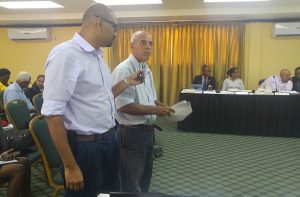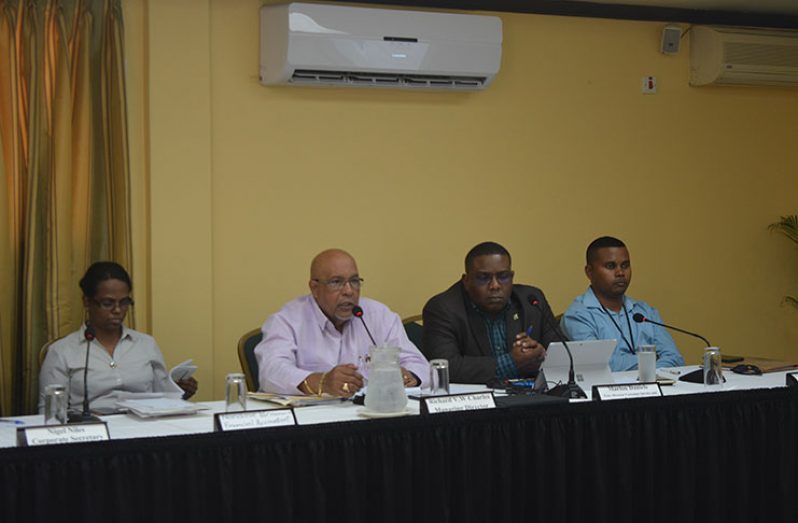… Stakeholders argue both for and against
THE Public Utilities Commission (PUC) has declared closed the hearing into the application of change of rates for the Guyana Water Incorporated (GWI) following the discussion and clarification of remaining issues.
The third and final session took place on Wednesday at the Cara Lodge and heard a series of questions coming from a panel of PUC members and the public.
GWI gave responses to matters on water quality, customer rates, production cost, cost recovery and additional funding but began by addressing the state of its financial audits.
At the last meeting the PUC had requested that before the water company considers a tariff increase it should submit its 2016 unaudited financial statements as it awaited the completed audited version.
The said statements were completed on Tuesday and GWI Chief Executive Officer (CEO) Dr Richard Van West-Charles said this now makes way for the 2017 audits which should be completed within an average of three months.
Getting down to business, the PUC challenged GWI on whether size should determine the rates non-residential customers pay, to which the CEO replied was a fair decision when considering smaller commercial entities.
In a follow-up, the PUC asked how the GWI would be able to discern whether a property houses a business and what considerations are in place for properties which include both residential and non-residential customers.
Van West-Charles said that the company will monitor the consumption of residential customers utilising the exceeding of the $150/m³ rate and information from on-the-ground workers as determinants of extra ongoing activities.

Meanwhile, residents who have businesses at the bottom of their buildings will be provided with separate accounts.
For customers with non-functioning meters, instead of being given an estimated bill, the company will temporarily move these customers to ‘unmetered’ status having those rates apply until the issue can be fixed.
When the public was given the opportunity to ask questions, Financial Analyst Ramon Gaskin said that the GWI needed to “get more tough with its business”.
“I’m concerned with GWI itself as a company, and the way it is managed when it comes to the commission for raises. GWI is receiving, in 2016; less revenue on the measured water with $2.1B as against $2.3B in the previous years.
“They’re doing more work, spending more money, investing more and earning less. This is a big problem for any company,” he said.
He advised the PUC against recommending additional funding for the water company and criticised the absence of cost recovery in Regions 7, 8 and 9.
“I don’t get the impression that you’re getting money from the consumers. Of course they’re entitled to water like everybody else but who is going to pay for it?” he questioned, adding: “If the people in 7, 8 and 9 cannot afford it then they have to go to the Central Government.”
The CEO responded to Gaskin’s call for the removal of additional funding by highlighting that the cost for energy, employment, equipment, safety as well as Guyana’s wide geographical spread are factors which must considered.
“When you calculate the occupancy rate of hospitals, health centres, institutions, the prisons and so forth … and you look at that consumption and if you only calculate you will see what is the necessity in terms of the needs for the production capability of GWI, to meet that demand,” he said.
In addition, the high cost of water treatment is a matter the CEO said the Guyana Revenue Authority (GRA) has indicated its willingness to assist with and is determining whether these chemicals can be zero-rated.
He said that from 2015 to 2017 the water utility has collected approximately $800M more and is currently intensifying its collection process to collect from those in debt to the company.
He added that cost recovery is a gradual process and collections have begun in Region 9 and will be ongoing as the GWI continues to establish its presence and as regions evolve.
Another pensioner, George Cave, thanked the commission for the ample information presented on the website and, unlike Gaskin, was in favour of the GWI receiving additional funding for projects.
“I believe that GWI should be given some more money … I want to recommend to the PUC that you seriously consider giving them more money. Water is expensive and out of nothing comes nothing.
“There are some technical difficulties in regards to how to shift the money here and there but I honestly in my bones feel that GWI should be given more money,” he said.
Speaking on the sidelines after the hearing was declared closed, Chairperson of the Public Utilities Commission, Dela Britton, expressed her satisfaction with the process of the inquiry.
“This is the democratic process that allows for both sides and members of the public especially to give us the coloured complexion of their views on the whole issue.
“…We thought it went well, we thought it was an efficient process, we thought that it has given us enough material for us to now meet as a body to make our determination,” she said.
The public is allowed until April 20 to submit their views after which the PUC will be granted 60 days for review before coming to a final decision.













